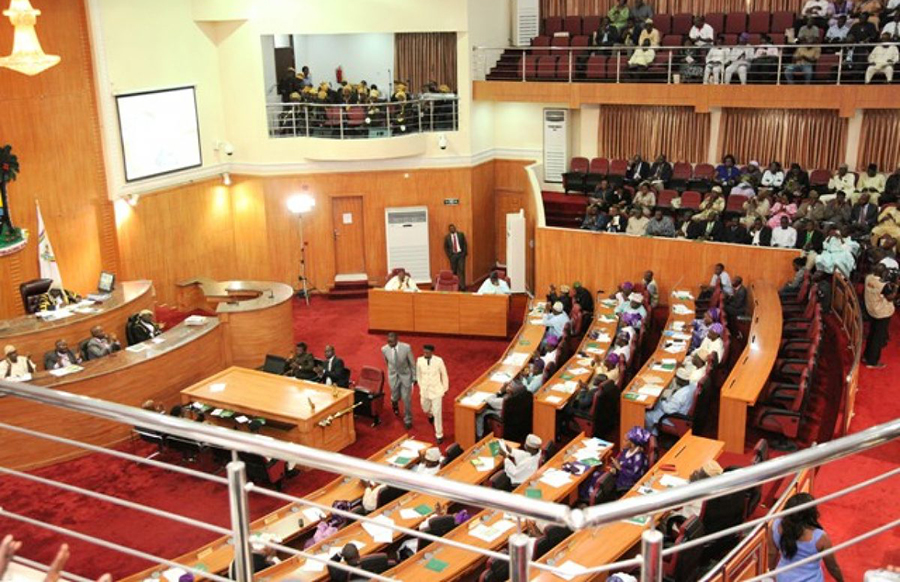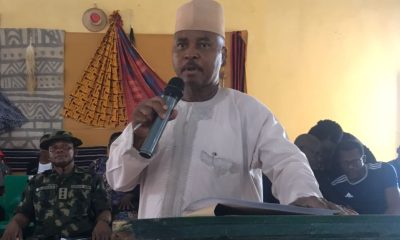Agriculture
New, Improved Cassava Varieties’ Launch Excite Kogi Farmers

From Joseph Amedu, Lokoja
The NextGen Cassava Project, being implemented by Cornell University, New York, in collaboration with the International Institute of Tropical Agriculture (IITA) and National Root Crops Research Institute (NRCRI), has launched new, improved cassava varieties in Kogi state.
The new, improved varieties include: Game Changer, Baba 70 and Poundable, which were part of the varieties released in 2020, was launched at Crest Agro Farms along Kabba-Lokoja Expressway, Lokoja over the weekend.
Speaking at the event, Dr Ismail Rabbi, a molecular geneticist and plant breeder with IITA, stated that years of consumer preference studies were conducted before releasing the varieties.
“In addition to high yield and stress tolerance, we found that these varieties are suitable for several agro-ecologies.
“Farmers, processors and consumers love these varieties because they were high-yielding, stress-tolerant, disease-resistant and had the right food properties.
“I am confident that farmers who adopt these varieties will make more profit and improve their livelihoods. These varieties are also a huge contribution to food security,” he said.
He explained that when cultivated with good agronomic practices and weed control, the new varieties produce more than 30 tons per hectare instead of the current national average yield of eight tons per hectare.
According to him, while Game Changer can produce 32 tons per hectare, Baba 70 can produce 38 tons per hectare. It was also proven that the new cultivars were drought-tolerant and resistant to the virus diseases of cassava.
As part of the inauguration, farmers and processors were taken to the field where the varieties were planted alongside an old improved variety, TME 419, 11 months ago and managed by Crest Agro.
After an assessment of the field as well as the plant architecture, the farmers participated in harvesting some of the roots to compare with TME 419.
The farmers expressed awe at the large sizes and number of roots produced by the varieties. They spoke about the difference between the new varieties and the old ones, saying Baba 70 and Game Changer were far ahead of the TME 419 they were used to. Some took a few stems to plant on their fields, saying they would love to adopt the new varieties.
There was also a demonstration of the processing of the new varieties to prove that their dry matter and starch contents were high and of great food value.
The participants witnessed the entire process from the farm to the table where they consumed garri, eba and fufu, chips and chinchin made from the two varieties.
The meals were consumed with vegetable and egusi stew made with cassava leaves.
Speaking on the field, Dr. Vishnuardhan Banda, Product Manager for Crop Variety Development, IITA, expressed joy that the farmers and processors were happy with the new varieties and eager to plant them on their farms.
He however urged them to always send feedback on the performance of the varieties to the researchers.
“We want you to work with us. You are very important in the process of crop improvement. You are the farmers and the first consumers. We urge you to always tell us how these varieties are performing on your various farms.
You have seen that these are very good varieties but we know that in years to come, you would need something new. Just keep giving us feedback about farmers’ choices and complaints, and we the breeders will be working with that information to give you new and better products.”
Ambassador Jaiyeola Lewu, a former Nigerian Ambassador to Brazil, Paraguay and Bolivia, and now a farmer, was present at the event.
While commending the NextGen project and the IITA and NRCRI scientists, Lewu described the varieties as game changers in the agricultural sector, saying “farmers will benefit immensely from them.”
He urged the project leaders to ensure that the products were available and assessible to the farmers who need them.
In his response, Dr. Godwin Atser, the Advocacy, Outreach and Promotions Lead of the IITA Building an Economically Sustainable Integrated Cassava Seed System, Phase 2 (BASICS-II) project, who spoke on behalf of Prof. Lateef Sanni, the Project Manager, stated that the BASICS-II project is using a seed system model to ensure that farmers get access to new and improved varieties.
“There is no gainsaying that farmers need new and improved varieties to improve their livelihoods, ensure food security and contribute to economic development. .
“That is why we created the BASICS model, which links Cassava Breeding Programs with Early Generation Seed Companies like IITA GoSeed and Umudike Seed to multiply the foundation seeds that are passed on to cassava seed entrepreneurs who produce certified seeds for onward dissemination to farmers,” he said.
Present at the product launch were farmers, processors, and representatives from Kogi State Ministry of Agriculture, Kogi State Agricultural Development Program, Nigeria Cassava Growers Association and other public and private sector stakeholders. IITA and NRCRI scientists were also in attendance.
Agriculture
Tiv Monarchs Give Herders Ten Days Ultimatum To Vacate Tiv Kingdom

By David Torough, Abuja
The Tiv Area Traditional Council during its emergency meeting held yesterday in the palace of the Tor Tiv in Gboko requested the Governor Hyacinth Alia led administration to create an enabling environment to allow herders’ peaceful exit of farmlands in Tiv Kingdom to facilitate resumption of farming activities.
Consequently, the Council directs political and traditional rulers in each local government area of Tiv Kingdom to peacefully engage the herders to ensure their exit from the local government areas to allow farming resumes.
The Council which was chaired by the Tor Tiv himself, HRM Prof James Ortese Iorzua Ayatse CFR equally appealed to all herders in Tiv Kingdom in Benue State to vacate all Tiv lands before the end of May 2025 to allow farmers return and cultivate their farms in order to avoid the looming hunger in Nigeria.
According to a Communique signed by the Secretary of the Council Mr Shinyi Tyozua which deliberated particularly on the security situation in Tiv Kingdom the Council enumerated the communities worst affected to include those in Kwande, Katsina Ala, Logo, Ukum, Guma, Makurdi, Gwer West Gwer East and Buruku Local Government Areas.
The Council lamented that farming activities in the kingdom have ceased due to the occupation of farmlands by herders for grazing and attacks and killings of farmers who fled stressing that if the situation continues it will ultimately result to hunger in Tiv Kingdom and Nigeria as a whole.
Agriculture
Ondo Govt. Destroys 200kg Seized Cocoa Adulterants

The Ondo State Government, on Thursday, destroyed 200kg adulterants used for adulteration of cocoa beans, seized from a merchant in Ondo West Local Government Area of the state.
Mr Segun Odusanya, Permanent Secretary in the Ministry of Agriculture and Forestry (Forestry and produce sub section), supervised the destruction of the 200kg bags of seized adulterants.
Odusanya explained that the destruction was part of government efforts to ensure that the state maintained quality cocoa production in the country.
“Mr governor, Lucky Aiyedatiwa, has reiterated the commitment to ensure the state remains the highest producing state with good cocoa quality
“Anyone caught engaging in illegal activities will be prosecuted accordingly.
“Moreover, this action was embarked on to warn cocoa merchants, who intend to engage in illegal activities, to rethink before getting into it.
“We are going to seal any store caught in such illegal activities, the products will be burnt while the merchant will be prosecuted according to the laws of the land.
“If we are saying we are the highest cocoa producing state and we continue to encounter this scenario, it will give us a bad publicity.
“The bad publicity will be in the country and extend to the international market, and we don’t want that,” he said.
The permanent secretary, therefore, commended Aiyedatiwa for graciously approving the recruitment of 60 new staff to checkmate the activities of cocoa merchants in the state.
“Mr governor has supported us, he has said we should recruit more people to guide against any adulteration and ensure we have a good quality cocoa beans.
“I must commended our task force committee for ensuring that the state holds its position in the country and the international market,” he said.
Earlier, Mr Tunji Akinnadeju, a Director of Produce (DP3) in the Grading and Allied Department of the ministry, said the adulterants were intercepted at Ondo West Local Government Area of the state.
Akinnadeju said that the owner of the adulterants took to his heels at the time of arrest.
“As we all know that cocoa is being sold in weight and after adding all these things, it will be sold at high prices, which is not good enough.
“So, doing that will bring a lot of damage to the image of the state and the country at large in the international market,” he said.
Also, Mr Sunday Adegbola, a Director of Produce Licensing in the ministry, said the merchants’ actions could affect people during consumption of the cocoa products, if care was not taken.
Adegbola, who pledged that the ministry would not rest until the state was free from adulterated cocoa beans, said the nefarious action could be attributed to the price tag at the international market.
“It is the price at the international market and the price is better for the farmers, not for the people who use adulterants.
“With this action, many people will drink cocoa as a chocolate powder and other materials from cocoa beans which has been adulterated.
“The consumption of these chemical products will also affect humans,” he said. (NAN)
Agriculture
NNPC Foundation Empowers Vulnerable Farmers in Oyo, Osun

No fewer than 500 farmers on Tuesday benefited from the NNPC Foundation agricultural training initiative for vulnerable farmers in Osun and Oyo States.
The training, marking the flag-off in the South-West zone of Nigeria, was held at the Ilora Baptist Grammar School, Ilora, Oyo State.
The foundation manages the Corporate Social Responsibility (CSR) initiatives of NNPC Limited, focusing on education, health, environment and energy access to communities nationwide.
The Managing Director of the foundation, Mrs Emmanuella Arukwe, said the initiative demonstrated the commitment to food security and economic empowerment for Nigerian farmers.
Arukwe, who was represented by Dr Bala David, the foundation’s Executive Director, Programme Development, said the project aimed to build resilience, boost productivity and promote sustainable agriculture.
“We are training 6,000 farmers across six zones in climate-smart practices, modern techniques, quality inputs, and market access,” she said.
She, therefore, urged farmers to participate actively and embrace the opportunity to help secure Nigeria’s food and economic future.
Mr Olasunkanmi Olaleye, Oyo State Commissioner for Agriculture and Rural Development, commended NNPC Foundation for the training and empowerment programme.
Olaleye, who was represented by Mr Olusegun Ezekiel, the ministry’s Director of Regulation and Enforcement, said empowering vulnerable farmers was crucial in addressing national food security challenges.
He added that the initiative aligned with Oyo State’s agricultural transformation agenda of Gov. Seyi Makinde.
“We remain committed to supporting initiatives that uplift farmers and improve productivity and livelihoods,” Olaleye said.
He encouraged participants to make the most of the training opportunity to improve their practices.
He also called for future collaboration between the foundation and the ministry to achieve greater impact.
The training consultant, Prof. Daniel Ozok, described vulnerable farmers as smallholders with an under-five-hectare farm size, mainly made up of women, youth, and the elderly.
“These farmers are most affected by climate shocks, hence the need for focused training,” Ozok said.
According to him, training equips them with modern techniques and strategies for improved productivity and market access.
Some of the participants expressed gratitude to NNPC Foundation and promised to apply the knowledge gained from the training.
NAN reports that a medical screening exercise was organised by the foundation for participants on the sidelines of the training.
Training initiative would later be held for farmers in Ekiti and Ondo States on a date different from that of Ogun and Lagos States. (NAN)


























